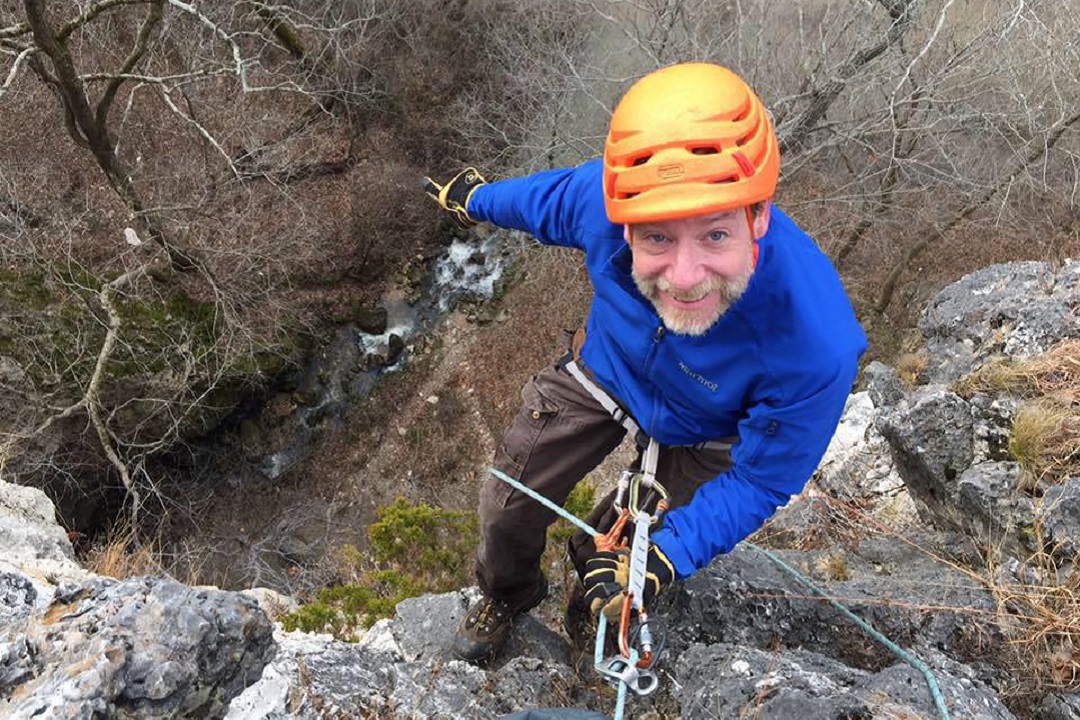From a young age, we’re taught that good manners are more than just a good idea. They define our everyday interactions, and we hope they keep us from witnessing the progress of our dinner date’s chewed food.
When the basics of etiquette are applied to rock climbing, it looks like this: Don’t be a jerk. Do be a good steward.
Of course, the nuances of climbing etiquette can be as expansive as El Cap is tall. With such an extensive list to choose from, our manners manifesto skips topics such as ethical bolting practices and big wall etiquette — both important but less applicable for most local climbers. Instead, our community helped shortlist four ways to be a well-mannered outdoor climber in the Midwest.
Pack In, Pack Out
“Pack in, pack out” is the basic rule for being a good steward. Conservation, safety, and continued access rely on climbers — and all outdoor enthusiasts — limiting activities that crush vegetation, create erosion, affect wildlife behaviors, or pollute the outdoors with food debris, trash, and the big, brown number two.
“It’s impossible to leave no trace, but it’s possible to leave less trace. We can pack a zero-waste lunch or plan our morning constitutional before heading out to the wall. As an instructor, one of the things I do is pick up trash in front of clients. Broken glass, orange peels, cigarette butts, wrappers — it’s all trash.” —Jim Gender
“In Grand Teton National Park, you get a poop bag with your backcountry permit. We were so excited to get rid of our bags after carrying them around for three days! There’s nothing more discouraging than going somewhere beautiful and seeing evidence of people who didn’t think that what they left behind affects the environment or others.” —Lana Harlow Bania
Speak Up for Safety
How comfortable are you having a “that looks sketchy” conversation? We know to double check our belay partner, but the stakes are equally as high for strangers. Looking out for each other includes avoiding condescending criticism or rude reactions that could lead some to second guess speaking up for safety.
“If the risk is so high that it could result in death or bodily injury, my default is to throw politeness out the window and address what’s happening. It’s our responsibility as climbers to expand our knowledge of and longevity in the sport.” —Erin Leigh Coates
“We were at Horseshoe and waiting for a couple to finish a route we wanted to climb. The guy trucks on up the wall, then starts to clean the route. He decided to lower instead of repel but didn’t communicate that to his belayer, who took him off belay out of habit. He was about to let go when I noticed. I started yelling: ‘NO! NO! NO!’ and ran over as fast as I could. He held on, and she put him back on belay. It’s an 80-foot route. He definitely would’ve died.” —David Gladden
“I’m pretty aware of the stuff we used to do that’s antiquated. Not that they aren’t safe, it’s just not necessarily the best way. When something is life threatening, that’s when we must address the issue. On the flip side, we also have to be able to accept criticism.” —Jim Gender
Go Sprawless
Yard sales, crag dogs, and caravans could each have a category of its own, but the gist of going “sprawless” is keeping belongings and groups managed. It means don’t block trails, keep pets leashed, and leave the crowds for the gym. Thank the sprawlessly courteous for reducing the chances of your belayer or spotter getting distracted.
“Try to keep your yard sale at a minimum. If you notice that people around you are having to dance around your gear, be polite and move it.” —Daniel Provasnik
“Only you love your dog. Even if you think your dog is a sweetheart, it can scare or bite or distract a belayer. Leash it or leave it at home.” —Aysin Ihnat
“It’s rude to monopolize routes or leave gear on the wall if you’re not climbing. If you want to take a break, fine, let others get in the rotation while you’re resting, especially if you have a big group taking up several routes.” —Sean Rhode
Shhhhhh!
The noisy atmosphere that epitomizes indoor rock climbing — music, route setters drilling, screaming birthday partyers — stifles the one-with-nature experience and can muddle communication between outdoor climber and belayer. On the less dangerous but more annoying side of shhhhhh are those who freely share every tip in their repertoire. Etiquette strictly prohibits beta in the following forms: unsolicited, sprayed, excessive, or onsight robbing.
“Two years in a row, we somehow ended up at the same crag as a large group who were on a yoga/climbing outing. It was so loud we had to send our climber up with a walkie talkie, so we could communicate. If a climber and belayer can’t hear each other because you’re having a ‘party’, the result can be devastating.” —Rich Sypniewski
“Be considerate. Some people don’t like music while they climb. If you do, ask the people around you if it’s OK. If you bring a drone with you to film yourself climbing, ask the people around you if it’s going to be a distraction.” —Daniel Provasnik
“A little encouragement from below goes a long way! Cheer them on but make sure to ask if they actually want any beta before giving unsolicited advice.” —AmyRose Tomlinson
As climbers, we adapt and commit to certain practices and expect the same of those around us. Our every choice to be or not to be courteous of people and places has repercussions. As limited destinations increasingly overflow with other lovers of the sport, it’s never been more important to have good climbing etiquette.
Author: Corrie Hendrix Gambill is a regular contributor to Terrain Magazine. Thanks to Jim Gender of Vertical Voyages for his insightful contribution to this story.


Leave A Comment